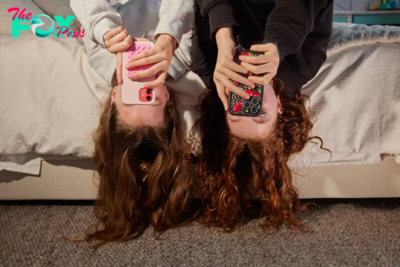Health
The skin microbiome could be harnessed as mosquito repellent, study hints
Tweaking the microbes that populate our skin may be an effective strategy to deter mosquitoes from biting us and thus curb the spread of mosquito-borne diseases, a new study hints.
Scientists previously knew that mosquitoes sniff out humans to bite by zeroing in on our unique scents, including chemicals released by oil and sweat glands in the skin. Sweat glands also release different molecules that skin microbes then break down to use as nutrients; the metabolism of these nutrients releases small molecules with specific odors, which can then attract mosquitoes.
Now, a study has pinpointed chemicals generated by the skin microbiome that can actually repel mosquitoes. Specifically, this natural perfume drives away a species called Aedes aegypti, which spreads diseases such as chikungunya, dengue, yellow fever and Zika.
Related: Should we kill every mosquito on Earth?
The findings, published Jan. 18 in the journal Scientific Reports, suggest that modifying the skin microbiome to release certain scents could be an effective strategy for preventing mosquito bites. The researchers say this approach could theoretically be safer than using synthetic mosquito repellents — for instance, bug sprays — that can wear off after a few hours and may cause skin irritation.
The researchers were motivated to find new tools to prevent the spread of mosquito-borne diseases, study first author Iliano Vieira Coutinho-Abreu, a researcher at the University of California, San Diego, told Live Science in an email. We need new tools because some mosquito populations are developing resistance to insecticides and the parasites the pests carry are developing drug resistance, he said. These include parasites that cause malaria, for instance.
So Coutinho-Abreu and colleagues turned to the human skin microbiome. "Targeting the source of human attractive cues to mosquitoes, which is the human skin microbiome, could lead to protection against mosquito bites and disease transmission," he said.
The research team grew several strains of bacteria that belong to the genera Staphylococcus and Corynebacterium — two broad groups of microbes commonly found on human skin. They grew the bacteria in conditions similar to those found on the skin and then profiled the "volatiles" — often smelly chemicals that evaporate quickly — released by the microbes. They tested the effect of some of these volatiles on A. aegypti mosquitoes' behavior.
To do so, the team set up a chamber for the buzzing pests. One end of the chamber contained plastic mesh coated with a smelly volatile compound, and the other end had plastic mesh imbued with an odorless compound, such as water, as a comparison. Then, they measured the time mosquitoes spent near each skin volatile compared with the odorless compound.
They identified three skin volatiles that repelled the mosquitoes: 2-methyl butyric acid, 3-methyl butyric acid and geraniol. The first two scents are commonly found in fruits like apples, while geraniol is the major component in citronella and rose oils.
The researchers also confirmed that mosquitoes were strongly drawn to lactic acid, a known mosquito attractant, being produced by the bacteria. Interestingly, some of the skin volatiles — such as octanol and acetic acid — did not draw mosquitoes unless they were combined with lactic acid. This suggests lactic acid affects how other chemicals on the skin attract mosquitoes.
Based on these results, the authors propose that skin microbiota could be changed to stop making attractant chemicals or to produce repellent chemicals. They also suggest that altering the skin microbiome to somehow produce less lactic acid could help prevent mosquito bites and subsequently curtail the spread of mosquito-borne diseases.
Since releasing the Scientific Reports paper, the team has published new results that support this hypothesis, although they have not been peer-reviewed yet.
In that new study, "[We] knocked out a gene belonging to the lactic acid synthesis pathway in two human skin resident bacteria to prove the importance of lactic acid as a key attractant to mosquitoes," Coutinho-Abreu said. Applying these genetically engineered bacteria to the skin of lab mice significantly reduced the numbers of mosquitoes that landed on the rodents for multiple days.
"These results imply that mosquitoes would be less prone to feeding on humans coated with such knockout lines of skin bacteria, reducing the likelihood of mosquito bites and pathogen transmission," Coutinho-Abreu said.
—New invasive mosquitoes descend on Florida, raising concerns of disease
—Which animal kills the most people every year?
—Skin microbes betray your age
The next steps will involve testing the safety of applying these engineered bacteria to mouse skin and testing whether this repels any mosquito species other than A. aegypti. After that, Coutinho-Abreu said they would hope to eventually move into human trials of a similar treatment.
This article is for informational purposes only and is not meant to offer medical advice.
Ever wonder why some people build muscle more easily than others or why freckles come out in the sun? Send us your questions about how the human body works to [email protected] with the subject line "Health Desk Q," and you may see your question answered on the website!
-

 Health2d ago
Health2d agoTeens Are Stuck on Their Screens. Here’s How to Protect Them
-

 Health2d ago
Health2d agoHow Pulmonary Rehab Can Help Improve Asthma Symptoms
-

 Health2d ago
Health2d ago10 Things to Say When Someone Asks Why You’re Still Single
-

 Health3d ago
Health3d agoThe Surprising Benefits of Talking Out Loud to Yourself
-

 Health3d ago
Health3d agoDoctor’s bills often come with sticker shock for patients − but health insurance could be reinvented to provide costs upfront
-

 Health3d ago
Health3d agoHow Colorado is trying to make the High Line Canal a place for everyone — not just the wealthy
-

 Health4d ago
Health4d agoWhat an HPV Diagnosis Really Means
-

 Health4d ago
Health4d agoThere’s an E. Coli Outbreak in Organic Carrots



























